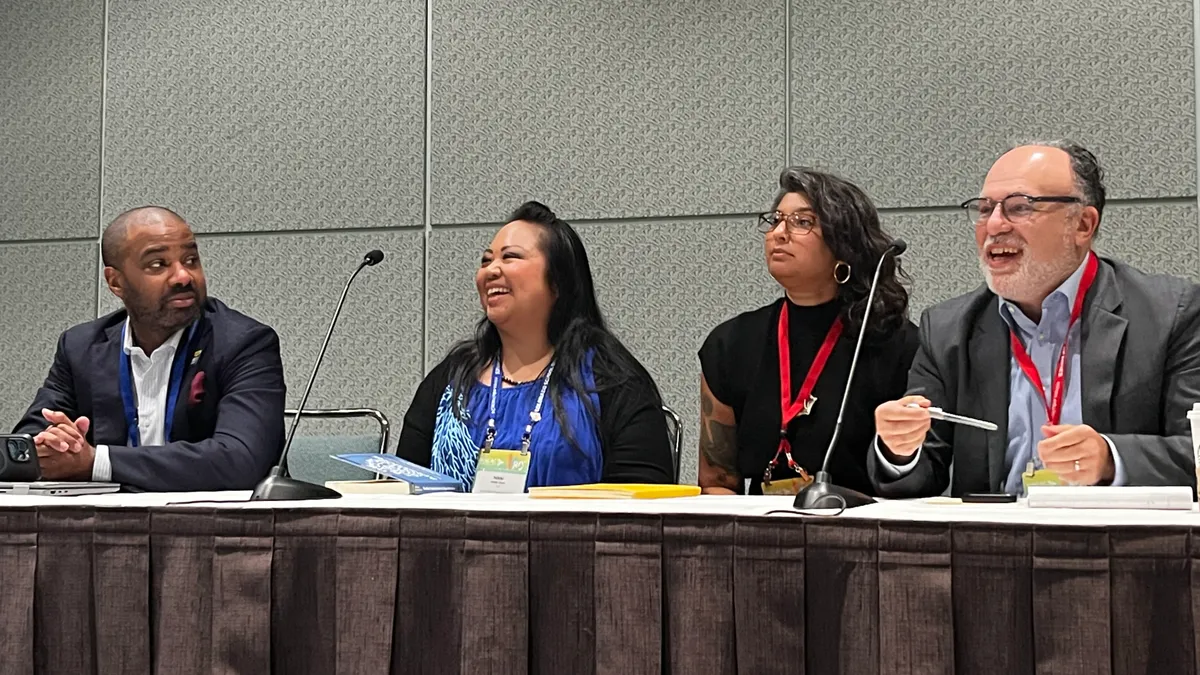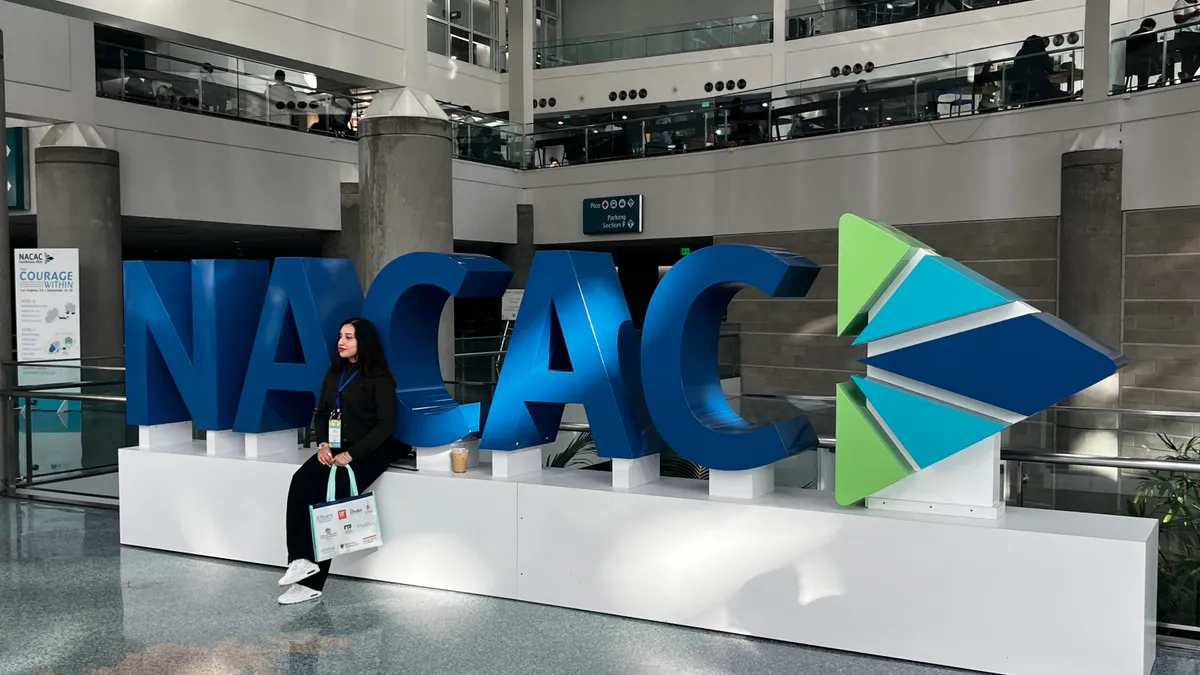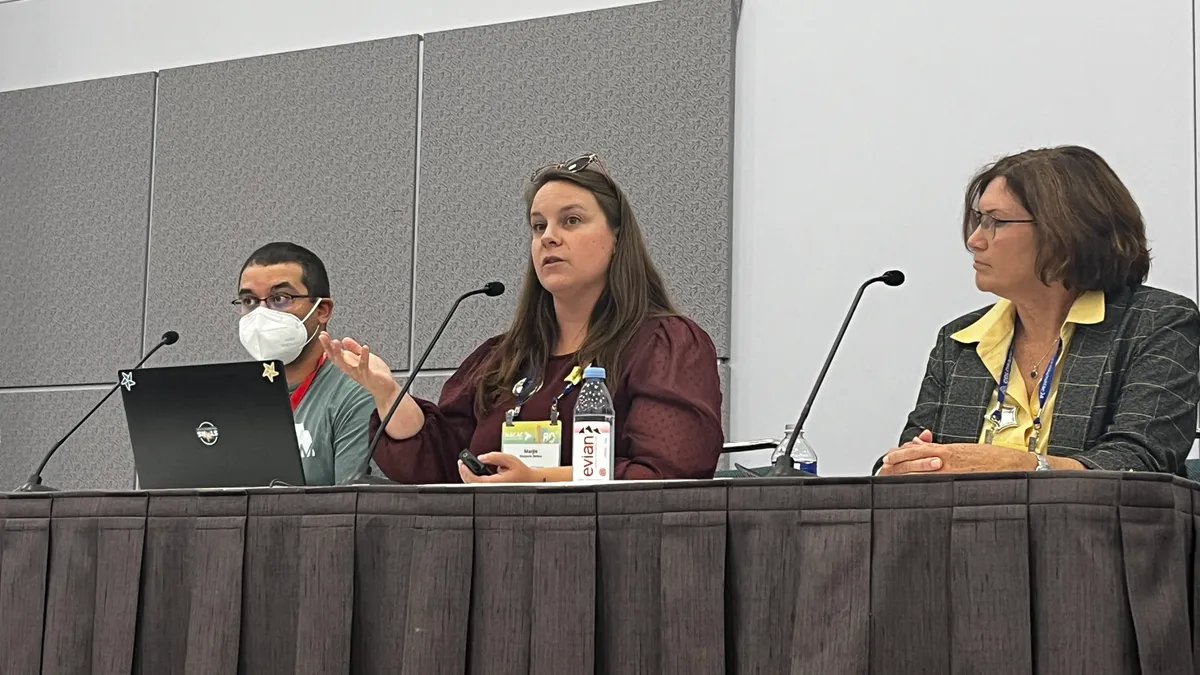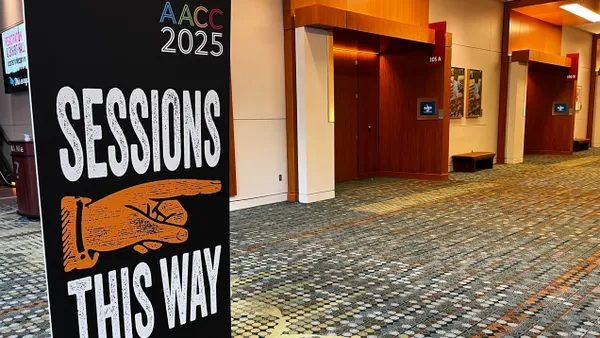LOS ANGELES — Test-optional admissions policies are at an inflection point.
More than 2,000 four-year colleges in the U.S. are not requiring SAT or ACT scores for fall 2025 admissions, according to FairTest, a nonprofit that advocates for limited application of entrance exams. This list includes highly selective colleges — such as Columbia, Vanderbilt and Duke universities — all of which made the switch at the start of the COVID-19 pandemic.
But other well-known institutions like Dartmouth College and Brown University have returned to standardized test requirements, leaving aspiring college students to navigate a patchwork of testing policies.
During a Saturday panel, higher education experts at the National Association for College Admission Counseling’s annual conference shared the benefits and drawbacks of test-optional policies and offered guidance to college leaders about how to communicate their expectations to potential applicants.
Predictors of student success?
Advocates for standardized testing say the scores help college officials determine which applicants would thrive academically at their institutions.
But Harry Feder, executive director of FairTest, pushed back on this argument.
"What do the tests tell us? They tell us how wealthy your parents are. To near perfect correlation," he told conference attendees.
Students from families in the top 1% of income are 13 times more likely than students from the bottom 20% to score 1300 or higher on the SAT, Feder said, citing an analysis last year from research group Opportunity Insights. And only 2.5% of students from the lowest income quintile scored 1300 or above.
Wake Forest University, a private research institution in North Carolina, adopted its own test-optional policy in 2008 — well before the pandemic. It hasn’t found differences in academic achievement between students who elected to submit test scores and those who didn’t, Feder said.
The University of Hawai'i at Mānoa is temporarily test optional, though Nikki Chun, the university's vice provost for enrollment management, is working to make the change permanent.
"I have not seen that standardized tests show the strengths of Native Hawaiian students and students local to Hawai'i," said Chun, a Honolulu native. "It just doesn't show our best selves."
Sheila Akbar, president and CEO of the academic consultancy Signet Education, reinforced this point.
"Doing things quickly, staying focused, moving in a straight line from one thing to the other — it's very Eurocentric," Akbar said. "That's all baked into the SAT and the ACT."
The majority of four-year colleges do not require entrance exams. But academia's obsession with standardized tests is spurred by the general public's fascination with a handful of top institutions, according to Feder.
"The day that Yale went back to requiring the SAT, there was an article in the New York Times about it," he said. Yet the University of Michigan had announced only the day before that it was formally keeping its test-optional policy.
But Feder said he didn’t see the University of Michigan's policy get the same media coverage. That's despite the public flagship drawing more applicants and having a larger undergraduate student body than Yale.
Serving underrepresented students
Timothy Fields, senior associate dean at Emory University, said having more data — including test scores — comes with benefits. But requiring these scores also comes at a cost, leading many prospective students to self-reject by not applying, he said.
Like the University of Hawai'i at Mānoa, Emory is maintaining its test-optional policy on a temporary basis. The private Atlanta institution has yet to announce if it will extend the policy for the 2025-26 application cycle.
"As we're talking with faculty, we say, 'If we go back to requiring tests, what will the cost be to the makeup of our applicant pool?'" Fields said. "One thing that can't be argued — students who aren't in the applicant pool have no chance of being admitted."
This semester, 77% of Emory's new students who were the first in their families to attend college did not submit test scores, according to Fields. And 74% of new students from neighborhoods with lower than average educational outcomes didn't submit test scores either.
"We've seen a lot of benefits to our applicant pool, especially to the diversity of the students who are applying by being test optional," he said. Plus, the overall number of applications grew, he said.
Longer term, Emory has found no difference in student retention based on their standardized test scores, according to Fields.
What do the tests tell us? They tell us how wealthy your parents are. To near perfect correlation.

Harry Feder
Executive director of FairTest
Colleges need to give test-optional policies guidelines at least three years to effectively evaluate their outcomes, Chun said. Many are reversing their pandemic-era policies before they even graduate a cohort admitted without test scores.
"Really, the test of effectiveness comes three or four years down the road, in graduating classes and retention stats," she said.
Offering prospective students guidance
Akbar said the students and parents she works with have a hard time believing they truly don't need to submit scores to test-optional colleges. And that feeling is often reinforced by conflicting messages from colleges.
Akbar said she will show families institutional profiles on the Common Data Set. The database — a collaboration led by the College Board, U.S. News & World Report and educational services Peterson’s — offers standardized college profiles that include information about their admissions methodology.
"We'll see a test-optional school that has marked test scores as 'very important' on the CDS. What are we supposed to make of that?" she asked. "It gives truth to their skepticism."
To combat confusion and weakening trust, Akbar said colleges should clearly communicate their expectations and define what makes a strong applicant.
"If a college doesn't take control of the story, somebody else will. And it will not be the story that you want out there," Akbar said.
Shifting test policies
The California Institute of Technology, known more commonly as CalTech, announced in June 2020 that it would switch to test-free admissions. While students can elect to include test scores under a test-optional policy, under test-free policies an admissions team will not accept or consider applicants' SAT and ACT scores.
At that time, Chun served as CalTech's director of undergraduate admissions, and she said the distinction was crucial.
"I kept saying to the faculty, there is no world where somebody is going to be convinced that CalTech is test optional," Chun said. "I do not want our staff spending an inordinate amount of time trying to explain to students, 'No, really, we mean optional!'"
In 2022, CalTech said an internal study found that standardized test scores “have little to no power” predicting first-year students' academic performance in mandatory math and physics classes.
However, the highly selective institution ultimately restored its standardized test requirement for undergraduate admission this April.
The change followed a recommendation from a faculty advisory committee. The university said the scores provide "useful information about academic preparedness as part of a holistic consideration of all prospective students.”
CalTech's reversal took effect immediately, beginning with students applying this fall.
Quick admissions changes are part of why many students and their families are so wary of taking colleges' policies at face value, according to Akbar. Not only are prospective students navigating different rules for each college they consider, she said, they are being forced to predict if and when those policies may change.
"That also makes people more skeptical about this year," she said. "If you're requiring it next year, that probably means you really want it from me this year. It's quite fraught and very frustrating."
Colleges should give applicants as much warning as possible about changes and maintain clear communication about their motivations for any shifts, Akbar said.
She cited Yale University as an example. The Ivy League institution announced in February that it would again require applicants to submit standardized test scores for the fall 2025 term and beyond.
While Akbar wasn't thrilled with the reversal, she appreciated how much context Yale officials provided. For example, they published the middle 80% of scores from the university's accepted class in 2020.
Most colleges only share the middle 50%, she said, and the broader range gives applicants a better sense of who has a chance of acceptance.
It's also noteworthy that Yale shared average scores from a pre-pandemic cohort, she said.
"We all know that test scores got inflated through test-optional policies," Akbar said. "It's not that students didn't earn these scores, but rather, only students with very strong scores were submitted." Because of this, a more recent range of scores could discourage applicants who could be strong contenders.

















